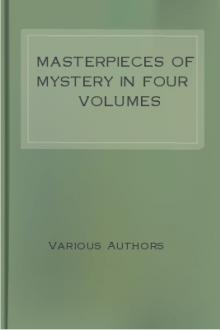Varney the Vampire; Or, the Feast of Blood by Prest and Rymer (ereader iphone .txt) 📗

- Author: Prest and Rymer
Book online «Varney the Vampire; Or, the Feast of Blood by Prest and Rymer (ereader iphone .txt) 📗». Author Prest and Rymer
"What's that you say?" cried Jack—"hollands!—who's got any?—next to rum and Elizabeth Baker, if I has an affection, it's hollands."
"Jack!" said the admiral.
"Ay, ay, sir!" said Jack, instinctively.
"Come this way."
Jack staggered after him, and they all reached the room where the admiral and Mr. Chillingworth had been sitting before the alarm.
"There!" said the admiral, putting the light upon the table, and pointing to the bottle; "what do you think of that?"
"I never thinks under such circumstances," said Jack. "Here's to the wooden walls of old England!"
He seized the bottle, and, putting its neck into his mouth, for a few moments nothing was heard but a gurgling sound of the liquor passing down his throat; his head went further and further back, until, at last, over he went, chair and bottle and all, and lay in a helpless state of intoxication on the floor.
"So far, so good," said the admiral. "He's out of the way, at all events."
"I'll just loosen his neckcloth," said Mr. Chillingworth, "and then we'll go and sit somewhere else; and I should recommend that, if anywhere, we take up our station in that chamber, once Flora's, where the mysterious panelled portrait hangs, that bears so strong a resemblance to Varney, the vampyre."
"Hush!" said the admiral. "What's that?"
They listened for a moment intently; and then, distinctly, upon the gravel path outside the window, they heard a footstep, as if some person were walking along, not altogether heedlessly, but yet without any very great amount of caution or attention to the noise he might make.
"Hist!" said the doctor. "Not a word. They come."
"What do you say they for?" said the admiral.
"Because something seems to whisper me that Mr. Marchdale knows more of Varney, the vampyre, than ever he has chosen to reveal. Put out the light."
"Yes, yes—that'll do. The moon has risen; see how it streams through the chinks of the shutters."
"No, no—it's not in that direction, or our light would have betrayed us. Do you not see the beams come from that half glass-door leading to the greenhouse?"
"Yes; and there's the footstep again, or another."
Tramp, tramp came a footfall again upon the gravel path, and, as before, died away upon their listening ears.
"What do you say now," said Mr. Chillingworth—"are there not two?"
"If they were a dozen," said the admiral, "although we have lost one of our force, I would tackle them. Let's creep on through the rooms in the direction the footsteps went."
"My life on it," said Mr. Chillingworth as they left the apartment, "if this be Varney, he makes for that apartment where Flora slept, and which he knows how to get admission to. I've studied the house well, admiral, and to get to that window any one from here outside must take a considerable round. Come on—we shall be beforehand."
"A good idea—a good idea. Be it so."
Just allowing themselves sufficient light to guide them on the way from the lantern, they hurried on with as much precipitation as the intricacies of the passage would allow, nor halted till they had reached the chamber were hung the portrait which bore so striking and remarkable a likeness to Varney, the vampyre.
They left the lamp outside the door, so that not even a straggling beam from it could betray that there were persons on the watch; and then, as quietly as foot could fall, they took up their station among the hangings of the antique bedstead, which has been before alluded to in this work as a remarkable piece of furniture appertaining to that apartment.
"Do you think," said the admiral, "we've distanced them?"
"Certainly we have. It's unlucky that the blind of the window is down."
"Is it? By Heaven, there's a d——d strange-looking shadow creeping over it."
Mr. Chillingworth looked almost with suspended breath. Even he could not altogether get rid of a tremulous feeling, as he saw that the shadow of a human form, apparently of very large dimensions, was on the outside, with the arms spread out, as if feeling for some means of opening the window.
It would have been easy now to have fired one of the pistols direct upon the figure; but, somehow or another, both the admiral and Mr. Chillingworth shrank from that course, and they felt much rather inclined to capture whoever might make his appearance, only using their pistols as a last resource, than gratuitously and at once to resort to violence.
"Who should you say that was?" whispered the admiral.
"Varney, the vampyre."
"D——e, he's ill-looking and big enough for anything—there's a noise!"
There was a strange cracking sound at the window, as if a pane of glass was being very stealthily and quietly broken; and then the blind was agitated slightly, confusing much the shadow that was cast upon it, as if the hand of some person was introduced for the purpose of effecting a complete entrance into the apartment.
"He's coming in," whispered the admiral.
"Hush, for Heaven's sake!" said Mr. Chillingworth; "you will alarm him, and we shall lose the fruit of all the labour we have already bestowed upon the matter; but did you not say something, admiral, about lying under the window and catching him by the leg?"
"Why, yes; I did."
"Go and do it, then; for, as sure as you are a living man, his leg will be in in a minute."
"Here goes," said the admiral; "I never suggest anything which I'm unwilling to do myself."
Whoever it was that now was making such strenuous exertions to get into the apartment seemed to find some difficulty as regarded the fastenings of the window, and as this difficulty increased, the patience of the party, as well as his caution deserted him, and the casement was rattled with violence.
With a far greater amount of caution than any one from a knowledge of his character would have given him credit for, the admiral crept forward and laid himself exactly under the window.
The depth of wood-work from the floor to the lowest part of the window-frame did not exceed above two feet; so that any one could conveniently step in from the balcony outride on to the floor of the apartment, which was just what he who was attempting to effect an entrance was desirous of doing.
It was quite clear that, be he who he might, mortal or vampyre, he had some acquaintance with the fastening of the window; for now he succeeded in moving it, and the sash was thrown open.
The blind was still an obstacle; but a vigorous pull from the intruder brought that down on the prostrate admiral; and then Mr. Chillingworth saw, by the moonlight, a tall, gaunt figure standing in the balcony, as if just hesitating for a moment whether to get head first or feet first into the apartment.
Had he chosen the former alternative he would need, indeed, to have been endowed with more than mortal powers of defence and offence to escape capture, but his lucky star was in the ascendancy, and he put his foot in first.
He turned his side to the apartment and, as he did so, the blight moonlight fell upon his face, enabling Mr. Chillingworth to see, without the shadow of a doubt, that it was, indeed, Varney, the vampyre, who was thus stealthily making his entrance into Bannerworth Hall, according to the calculation which had been made by the admiral upon that subject. The doctor scarcely knew whether to be pleased or not at this discovery; it was almost a terrifying one, sceptical as he was upon the subject of vampyres, and he waited breathless for the issue of the singular and perilous adventure.
No doubt Admiral Bell deeply congratulated himself upon the success which was about to crown his stratagem for the capture of the intruder, be he who he might, and he writhed with impatience for the foot to come sufficiently near him to enable him to grasp it.
His patience was not severely tried, for in another moment it rested upon his chest.
"Boarders a hoy!" shouted the admiral, and at once he laid hold of the trespasser. "Yard-arm to yard-arm, I think I've got you now. Here's a prize, doctor! he shall go away without his leg if he goes away now. Eh! what! the light—d——e, he has—Doctor, the light! the light! Why what's this?—Hilloa, there!"
Dr. Chillingworth sprang into the passage, and procured the light—in another moment he was at the side of the admiral, and the lantern slide being thrown back, he saw at once the dilemma into which his





Comments (0)